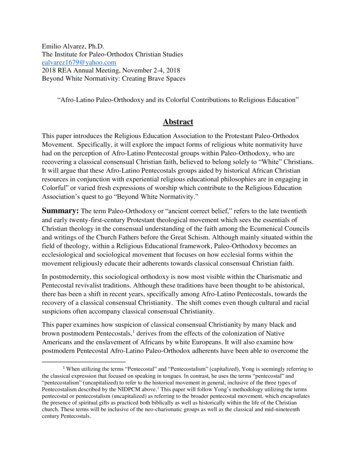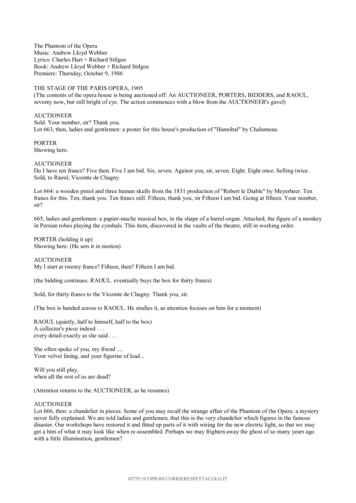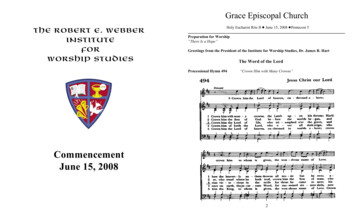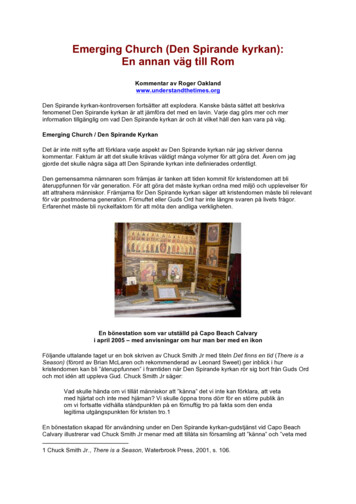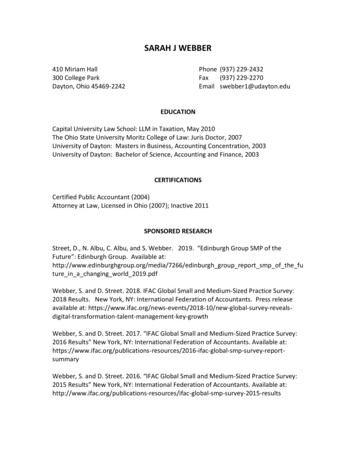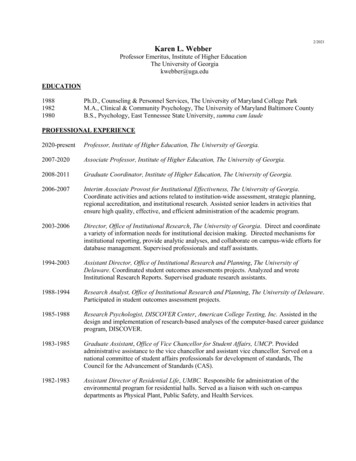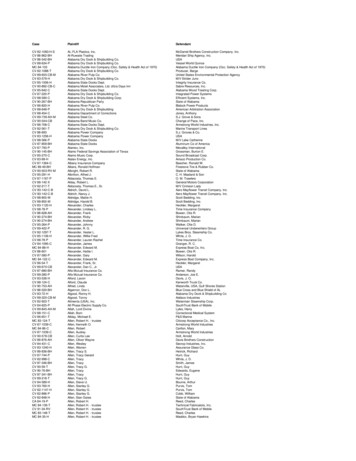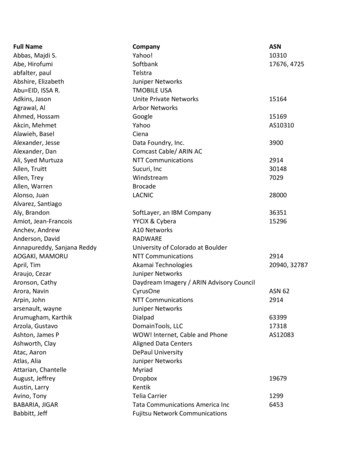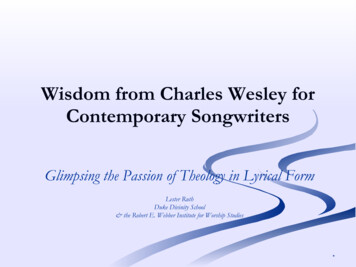
Transcription
Wisdom from Charles Wesley forContemporary SongwritersGlimpsing the Passion of Theology in Lyrical FormLester RuthDuke Divinity School& the Robert E. Webber Institute for Worship Studies*
TO ACCESS THIS POWERPOINTGo to sites.duke.edu/lruth and look for publicpresentations. You’ll also find there the fuller studies comparingthe most-republished evangelical hymnody up tothe Civil War and the most-used CCLI songs. *
WHY? WHY SO LITTLETHEOLOGY?A suggestion: “Songwriters are afraid if theybecome theological they will lose their passion forGod.”*
QUESTIONSDo we love God for theological reasons? Do we know that God loves us in theologicalways? Do we separate theology from piety, especially inour songwriting and song selection? *
CHARLES WESLEYA Positive Example of Integration of Head andHeart, Theology and Piety, Theology and Love A Positive Example of Theology Fueling Passionfor God. He offers several lessons for the contemporarysong writer. *
LESSONS FROM WESLEYBe taken up with a fundamental paradox of theChristian faith: the Incarnation *
THE PARADOX IN CHRIST’SBIRTH The appearance of the invisibleGod, the invisible appears.God, the blest, the great I AMSojourns in this vale of tears,And Jesus is his name.“Glory Be to God on High,” Hymn 4, Hymns for the Nativity of Our Lord, 1745*
THE PARADOX IN CHRIST’SBIRTH The “start” of the source of all existenceEmptied of his majestyOf his dazzling glories shorn,Being’s source begins to be,And God himself is born!“Glory Be to God on High,” Hymn 4, Hymns for the Nativity of Our Lord, 1745*
THE PARADOX IN CHRIST’SBIRTH The containment of the uncontainableSee the eternal Son of God,A mortal son of manDwelling in an earthly clod,Whom heaven cannot contain!“Glory Be to God on High,” Hymn 4, Hymns for the Nativity of Our Lord, 1745*
THE PARADOX IN CHRIST’SBIRTHThe juxtaposition of heavenly glory andearthly humblenessGo see the King of glory,Discern the heavenly stranger,So poor and mean,His court an inn,His cradle is a manger. “Join All Ye Joyful Nations,” Hymn 6, Hymns for the Nativity of Our Lord, 1745*
CONTEMPLATION OF THE PARADOXICALGODLo! He lays his glory by,Emptied of his majesty!See the God who all things made,Humbly in a manger laid.“Sing, Ye Ransomed Nations, Sing,” Hymn 12, Hymns for the Nativity of Our Lord, 1745*
CONTEMPLATION OF THEPARADOXICAL GOD AS A BASIS FORWORSHIPSee in that infant’s faceThe depths of Deity,And labor while ye gazeTo sound the mystery;In vain: ye angels gaze no more,But fall and silently adore.“Let Earth and Heaven Combine,” Hymn 5, Hymns for the Nativity of Our Lord, 1745*
THE PARADOXICAL GOD SAVESGaze on that helpless ObjectOf endless adoration!Those infant hands,Shall burst our bands,And work out our salvation.Strangle the crooked serpent,Destroy his works for ever,And open setThe heavenly gate,To every true believer.“Join All Ye Joyful Nations,”Hymn 6, Hymns for the Nativity ofOur Lord, 1745*
THE PARADOX & THECRUCIFIXION‘Tis done! My God hath died,My Love is crucified!Break, this stony heart of mine,Pour, mine eyes, a ceaseless flood;Feel, my soul, the pangs divine,Catch, my heart, the issuing blood.“Saviour, the World’s and Mine,” hymn 26, 1780 Hymnal*
THE PARADOX & THECRUCIFIXIONO Love divine! What has thou done!Th’immortal God hath died for me!The Father’s co-eternal SonBore all my sins upon the tree:Th’immortal God for me hath died,My Lord, my Love is crucified.Hymn 27, 1780 Hymnal*
THE POWER OF BLOOD DIVINEBind up my wounds by opening thine,Apply the balm of blood DivineTo save a sinner poor.CWPT*
THE GREATNESS OF GODAS EVIDENCED IN THE INCARNATION:WESLEY’S APPROACH TO WORSHIPFUL AWENot God’s expansiveness (a sense of scale) Not God’s power (an awareness of overwhelming,incomparable ability) Not God’s distance (a sense of his separationfrom us) But the greatness of God on earth (the seemingincongruity/contradiction) *
LESSONS FROM WESLEYBe taken up with a fundamental paradox of theChristian faith: the Incarnation Juxtapose our personal story against a larger, morecosmic Story *
SALVATION AS PERSONAL STORYAnd can it be that I should gainAn interest in the Savior’s blood?Died he for me, who caused his pain?For me? Who him to death pursued?Amazing love! How can it beThat though, my God, shouldst die for me?Hymn 193, 1780 Hymnal*
SALVATION AS COSMIC STORY‘Tis myst’ry all: th’Immortal dies!Who can explore his strange design?In vain the first-born seraph triesTo sound the depths of love divine.‘Tis mercy all! Let earth adore!Let angel minds inquire no more.He left his Father’s throne above(So free, so infinite his grace!),Emptied himself of all but love,And bled for Adam’s helpless race.*
THE COSMIC BROUGHT “HOME”Emptied himself of all but love,And bled for Adam’s helpless race.‘Tis mercy all, immense and free,For, O my God, it found out me!*
AS EVIDENCED IN THEINCARNATION:WESLEY’S APPROACH TO Not God’s expansiveness (a sense of scale)WORSHIPFUL AWE Not God’s power (an awareness of overwhelming,incomparable ability) Not God’s distance (a sense of his separationfrom us) But the tension between the breadth of God’sgracious saving activity in Jesus, in which I have ashare.*
TRANSLATING INTOSONGWRITING DISCIPLINES New Poetic Ways to Trigger Awe:Avoid “holy,” “great,” “mighty,” and “above.” Avoid adjectives ending in –er or –est. But include some sense of the breadth of God’ssaving work: a range of persons or the human race orthe cosmos and wonder in the singer’s personal share. New Poetic Ways to Trigger Gratitude:Speak about human sinning (active verbs, not a noun)and divine saving (active verbs, not a noun) *
LESSONS FROM WESLEYBe taken up with a fundamental paradox of theChristian faith: the Incarnation. Juxtapose our personal story against a larger, morecosmic Story. Incorporate a dynamic sense of time andremembrance. *
THE RESURRECTION TODAYChrist the Lord is risen today,Sons of men and angels say!Raise your joys and triumphs high,Sing ye heavens, and earth reply.*
LOOK NOWSee in that infant’s faceThe depths of Deity,And labor while ye gazeTo sound the mystery;In vain: ye angels gaze no more,But fall and silently adore.“Let Earth and Heaven Combine,” Hymn 5, Hymns for the Nativity of Our Lord, 1745*
SEEING THE CRUCIFIED SAVIORSee the slaughter’d Sacrifice,See the altar stain’d with blood!Crucified before our eyesFaith discerns the dying God,Dying that our souls might live,Gasping at His death, Forgive!Hymn 18, Hymns on the Lord’s Supper*
OPEN WOUNDS & WARM BLOODStill the wounds are open wideThe blood doth freely flowAs when first His sacred sideReceived the deadly blow:Still, O God, the blood is warm,Cover’d with the blood we are;Find a part it doth not arm,And strike the sinner there!Hymn 122, Hymns on the Lord’s Supper*
EVOCATIVE THEOLOGYBeneath my load he faints and dies.I filled his soul with pangs unknown;I caused those mortal groans andcries;I killed the Father’s only Son!“Ye that Pass By, Behold the Man,” Hymn 24, 1780 Hymnal*
LESSONS FROM WESLEYBe taken up with a fundamental paradox of theChristian faith: the Incarnation. Juxtapose our personal story against a larger, morecosmic Story. Incorporate a dynamic sense of time andremembrance. Sing a biblical story from the inside out. *
PETER’S IMPRISONMENT &RELEASELong my imprisoned spirit lay,Fast bound in sin and nature’s night.Thine eye diffused a quick’ning ray;I woke; the dungeon flamed with light.My chains fell off, my heart was free,I rose, went forth, and followed thee.*
JACOB’S (THE CHRISTIAN’S) WRESTLINGMATCHCome, O thou Traveler unknown,Whom still I hold, but cannot see!My company before is gone,And I am left alone with thee;With thee all night I mean to stay,And wrestle till the break of day.*
In vain thou strugglest to get free,I never will unloose my hold;Art thou the Man that died for me?The secret of thy love unfold:Wrestling, I will not let thee goTill I thy name, thy nature know.*
‘Tis Love! ‘Tis Love! Thou diedst forme;I hear thy whisper in my heart.The morning breaks, the shadows flee,Pure Universal Love thou art:To my, to all, thy bowels move—Thy nature, and thy name, is Love.*
THE REALLY GOOD SAMARITAN The thieves have rob’d, and stript, andbound My putrid wounds stand open wide,My head is faint, and sick of pride,And all corrupt my heart But Life I see in death appear!The good Samaritan is near Bind up my wounds by opening thine,Apply the balm of blood Divine*
LESSONS FROM WESLEYBe taken up with a fundamental paradox of theChristian faith: the Incarnation. Juxtapose our personal story against a larger, morecosmic Story. Incorporate a dynamic sense of time andremembrance. Sing a biblical story from the inside out. Put the emphasis upon divine activity (Let Godhave good, strong verbs). *
PILING UP VERBS FOR JESUSDid not his word the fiends expel?The lepers cleanse, and raise thedead?Did he not all their sickness heal?And satisfy their every need?Did he reject his helpless clay?Or send them sorrowful away?“Sinners, Believe the Gospel Word,” Hymn 31, 1780 Hymnal*
O FOR A THOUSAND VERBSHe breaks the power of cancelled sin,He sets the prisoner free;His blood can make the foulest cleanHis blood availed for me.*
LESSONS FROM WESLEYBe taken up with a fundamental paradox of theChristian faith: the Incarnation. Juxtapose our personal story against a larger, morecosmic Story. Incorporate a dynamic sense of time andremembrance. Sing a biblical story from the inside out. Put the emphasis upon divine activity (Let Godhave good, strong verbs). Be mesmerized by the Trinity. *
STRUCTURING BY THE PERSONSSinners, turn, why will you die?God, your Maker, asks you why?God, who did your being give,Made you with himself to live;He the fatal cause demands,Asks the work of his own hands,Why, ye thankless creatures, whyWill you cross his love, and die?Hymn 6, 1780 Hymnal*
Sinners, turn, why will you die?God, your Savior, asks you why.God, who did your souls retrieve,Died himself that you might live.Will you let him die in vain?Crucify your Lord again?Why, ye ransomed sinners, whyWill you slight his grace, and die?*
Sinners, turn, why will you die?God the Spirit asks you why.He, who all your lives hath strove,Wooed you to embrace his love.Will you not the grace receive?Will you still refuse to live?Why, ye long-sought sinners, whyWill you grieve your God, and die?*
THE HOLY SPIRIT & THE SON INTHE ECONOMY OF SALVATIONSpirit of faith, come down,Reveal the things of God,And make to us the Godhead known,And witness with the blood:‘Tis thine the blood to apply,And give us eyes to seeWho did for every sinner dieHath surely died for me.*
No man can truly sayThat Jesus is the LordUnless thou take the veil away,And breathe the living word;Then, only then we feelOur interest in his blood,And cry with joy unspeakable,Thou art my Lord, my God!*
THE FATHER & THE SON IN THEECONOMY OF SALVATIONArise, my soul, arise,Shake off thy guilty fears;The bleeding SacrificeIn my behalf appears;Before the throne my surety stands;My name is written on his hands.*
Five bleeding wounds he bears,Received on Calvary;They pour effectual prayers,They strongly speak for me:Forgive him, Oh! Forgive, they cry,Nor let that ransomed sinner die.*
The Father hears him pray,His dear anointed One;He cannot turn awayThe presence of his Son:His Spirit answers to the blood,And tells me I am born of God.*
AWED BY GRACE(THE COMMON ELEMENT IN THE LAST SEVERALPOINTS)Grace portrayed as gracious, cooperative activityof a Triune God From our point of view, undeserved and lavish *
LESSONS FROM WESLEY FOR THECONTEMPORARY SONG WRITERBe taken up with a fundamental paradox of the Christianfaith: the Incarnation. Juxtapose our personal story against a larger, morecosmic Story. Incorporate a dynamic sense of time and remembrance. Sing a biblical story from the inside out. Put the emphasis upon divine activity (Let God havegood, strong verbs). Be mesmerized by the Trinity. *
THEOLOGY AND THE FIRE OF THELOVE OF GOD?Wesley demonstrates that profound theology isoil, not water, when thrown on the fire of the loveof God. *
SOURCES OF HYMNSTo access all the published hymns of Charles Wesley, googleDuke Wesley Texts. To see a list of Wesley texts for which new music has beenwritten, go to charleswesleysociety.org. *
TRANSLATING INTO SONGWRITING DISCIPLINES New Poetic Ways to Trigger Awe: Avoid "holy," "great," "mighty," and "above." Avoid adjectives ending in -er or -est. But include some sense of the breadth of God's saving work: a range of persons or the human race or the cosmos and wonder in the singer's personal share. New Poetic Ways to Trigger Gratitude:


